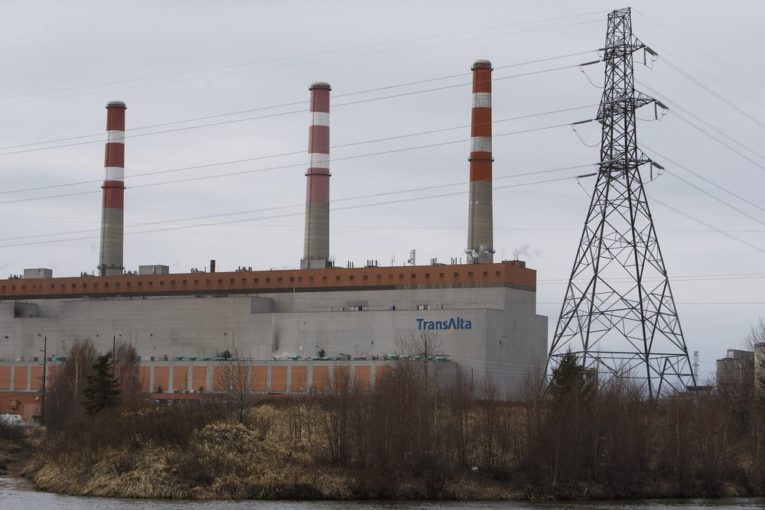
In just a few days, TransAlta Corp. will mothball two of its coal-fired power generating units in Alberta.
But days before the move occurs, a high-stakes battle has erupted between two influential agencies within the deregulated power system: the Alberta Electric System Operator, which manages the province’s power grid, and the electricity industry’s watchdog, the Market Surveillance Administrator.
The outcome will have consequences for consumers across the province, who face the prospect of higher electricity prices next month.
“It is absolutely affecting pricing,” said Vittoria Bellissimo, executive director of the Industrial Power Consumers Association of Alberta.
“This will affect everyone in Alberta.”
Earlier this month, the watchdog group filed a complaint with the Alberta Utilities Commission, a quasi-judicial regulatory agency, over the issue.
In its filing, the Market Surveillance Administrator argues an AESO rule that allows existing generating units to be temporarily parked for up to two years should be removed or altered.
The mothball rule, as it is called, “does not support the fair, efficient and openly competitive operation of the market (and) is not in the public interest,” the document states.
“In the short term, the MSA expects consumers will pay increased costs by virtue of the announced mothballs … since removing the anticipated level of TransAlta’s supply has increased pool prices.”
The kerfuffle comes after Alberta saw a steep drop in power prices during the recession.
The mothball rule, introduced in June 2016 on an expedited basis, lets generators temporarily withdraw an uneconomic unit from the market to reduce losses — or for any reason, the MSA says.
Last spring, TransAlta announced it would mothball one of six units at its Sundance facility, the largest coal-fired generating plant in Western Canada, at the start of 2018.
In December, the Calgary-based company said it would idle two more Sundance units on April 1. Another generating unit at Sundance, located west of Edmonton, will be mothballed in the spring of 2019.
Combined, these steps will withdraw 1,054 megawatts of capacity from the market; “a significant quantity,” according to the MSA.
After December’s announcement, power markets reacted quickly.
According to the administrator’s analysis, the forward power price for April rose $4.65 to $59.28 per MW-h, although the market has also been influenced by some natural gas-fired plants coming off line for maintenance next month.
In its filing, the independent enforcement agency contends AESO’s mothballing rule gives generators “an unfair competitive advantage,” permits physical withholding of power and may impact the system’s reliability.
It will also negatively impact the entry of new players into the market and “may create an opportunity for firms to collude that would not otherwise exist,” the complaint states.
The Alberta Utilities Commission said Tuesday it will seek input from market players on the matter until April 13 before determining its next steps.
The province’s electric system operator doesn’t appear to be backing down.
An AESO statement said the mothball rule was created to let it manage the reliability of the entire grid and promote an openly competitive market.
The rule includes requirements that ensure transparent behaviour, giving the market time to respond to the action, it said.
The system operator has the ability to recall mothballed units if they’re needed; outages are limited to 24 months, at which point a “return-or-retire” provision is triggered.
AESO is reviewing the watchdog’s complaint and anticipates it will participate in the regulator’s process.
TransAlta, meanwhile, is moving ahead with its plan to park the two Sundance units next month.
The company’s chief legal officer, John Kousinioris, pointed out TransAlta is relying on an existing rule AESO put in place “to let plants that are having a challenge with profitability, but may have value at a later date … basically be set aside or parked for a period of time.”
Power prices have been extraordinarily low in recent years and the company announced its decision three months ago to idle the plants as it prepares to convert some of its coal-fired fleet to burn natural gas, he noted.
The company is on the cusp of mothballing the units and “it’s not like we can flick a switch or turn on a dime and reverse our position,” Kousinioris added.
As for the impact on power markets, he noted residential consumers are protected from higher prices because the provincial government has capped prices for those on the regulated rate at $68 per MW-h.
“I don’t think it’s a situation where we are going to see people generating profits that are kind of in excess of what their needs are, to be honest,” he said in an interview.
“I don’t think this is a significant bump in pricing.”
People in the industry are watching the next steps closely.
David Gray, former head of Alberta’s Utilities Consumer Advocate, said the rule has the potential to impact future development and investment in the evolving electricity system.
“I would agree with what the MSA has done. At the end of the day, what you want to ensure is that you’ve got an openly competitive market,” he said.
Watching from the sidelines, consumer groups say the case will have implications for Albertans moving forward.
Jim Wachowich of the Consumers’ Coalition of Alberta said the MSA’s intervention should ensure checks and balances within the deregulated electricity system are working.
Bellissimo, whose group represents industrial customers such as energy companies, hopes to see the rules eventually changed to test the “economic reasonableness” of any generator being allowed to temporarily withdraw a unit.
“My concern with this is the oversight system is enabling something to occur that didn’t benefit consumers — and now we’re seeing higher prices than we otherwise would,” she said.
Chris Varcoe is a Calgary Herald columnist.
You can read more of the news on source
